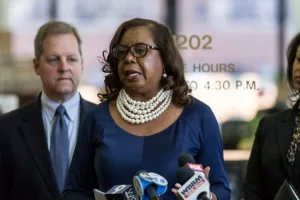 Circuit Court Clerk Dorothy Brown, shown here in March, is the most recent African-American to enter a crowded field for the 2019 mayoral race. Five of the current seven candidates are black. | Erin Brown/Sun-Times
Circuit Court Clerk Dorothy Brown, shown here in March, is the most recent African-American to enter a crowded field for the 2019 mayoral race. Five of the current seven candidates are black. | Erin Brown/Sun-TimesBlack people must be feeling empowered. Five of the seven candidates challenging Mayor Rahm Emanuel in the February 2019 mayoral election are African-American.
Given the boiling ire against Emanuel in black Chicago, the opportunity should be a sweet spot for a black candidate. Black folks have a lot at stake.
The African-American aspirants who have officially declared include Dorothy Brown, the five-term Cook County Circuit Court Clerk who also ran for mayor in 2007. Her entry in this go-round was a shocker, as she is the subject of a longtime federal investigation into allegations of corruption in her office.
OPINION
Wealthy businessman Willie Wilson, who challenged Emanuel in 2015, is back, kicking off this latest effort with a $100,000 personal donation to his campaign.
Also running is Neal Sales-Griffin, a 30-year-old tech entrepreneur who first caught the spotlight when he appeared in campaign ads for Democratic gubernatorial nominee J.B. Pritzker.
Another candidate aiming at younger voters is Black Lives Matter activist Ja’Mal Green, 22. He was a surrogate for Sen. Bernie Sanders’ 2016 presidential campaign.
Troy LaRaviere, also a Sanders supporter, is president of the Chicago Principals and Administrators Association.
(Joining them are Paul Vallas, the former Chicago Public Schools CEO, and ex-Police Superintendent Garry McCarthy).
There are more to come.
Black political, civic, and community leaders are watching, Alexandra P. Sims says. “Many of the African-American stakeholders are still looking at who’s coming. And who’s willing.”
Sims, one of my go-to sources on black politics, launched her public affairs firm APS & Associates a year ago. Her clients include the Chicago City Council’s Black Caucus and Bill Lowry, who is running for Cook County Commissioner in the 3rd District.
Sims is serving as a senior advisor to Pritzker’s gubernatorial campaign, working on political and field operations. She is neutral in the mayor’s race.
“There is a wide range of people with experience in Chicago who have government experience, corporate and private experience, non-profit experience,” who could run, she said last week over coffee.
African-American voters were pivotal for Pritzker. He won the Democratic gubernatorial nomination with 60 percent of the city’s black vote in the six-way race, shows Sims’ analysis of Chicago Board of Election data. And 51 percent of his Chicago vote came from African-American wards.
So just think what the black vote could do for a black mayoral candidate.
To make the runoff, the city’s black leadership will look for someone with the strongest credentials.
“A strong black candidate could win the election,” Sims said. “Someone with experience in government, in nonprofit, in private practice and has the relationships and most importantly, the money.”
Those are big shoes to fill.
Other shoes that may drop into the race include Chicago Police Board President Lori Lightfoot; City Treasurer Kurt Summers; Ra Joy, who ran for lieutenant governor with Chris Kennedy in the Democratic gubernatorial primary; and Stephanie Neely, a business executive, and former city treasurer. I hear all are looking at the race.
A multitude of black candidates would split the vote, making it impossible for one to make the runoff.
If a credible aspirant can emerge to big-foot the race, Chicago’s black leadership must unite and muscle out the others. Given the hefty egos, clashing agendas, and the fractured political history of black Chicago, that’s a dubious prospect.
Feeling empowered is not the same as winning power.
Email: lauraswashington@aol.com
Send letters to: letters@suntimes.com
Twitter @mediadervish
